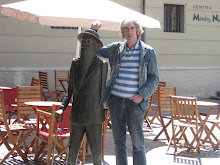Linguistic Success in Galicia?
According to a report in El País today (30th June), 90% of civil servants working for the Administración General del Estado (AGE) are bilingual in Galicia and Catalonia, compared to around 70% in Valencia, the Balearics and the Basque Country.
These are the conclusions of a report carried out by the AGE’s department for official languages itself. However, the Council of Europe is not entirely satisfied with those figures, and in a separate report last December, demanded that the AGE give more support to co-official languages, claiming there were weak areas in legal circles, postal and train services (RENFE).
The Age report admits that the security forces are the area most wanting, “well below 50%” due to their mobility. According to the AGE report “practically 100% of personnel in AGE services speak Galician (with only 40% of them defined as primarily Galician native speakers), compared to the second most successful area in this respect – Catalonia – where the figure is again said to be close to 100% in Girona and Lleida and around 85% in Barcelona and Tarragona.
I’m sure these statistics will be seriously questioned by Galician and Catalan language activists. From my point of view, this raises the question of what it actually means to speak Galician (or any other language for that matter) or to be bilingual. Are we talking about an ability and willingness to switch between both languages without any difficulty or is it something much more basic than that?
For instance, I could claim to speak French, Italian or Scottish Gaelic. I wouldn’t be lying as I have taken courses in these languages. However, this does not mean that I could comfortably hold a conversation with a native speaker in any of these languages. Far from it if the truth be told. In other words, it is very easy to say you speak a language or tick a box saying that you do but what this means is very subjective. I would seriously question the claim that close to 100% of civil servants in Galicia are bilingual in Galician as I think there are many who lack either/both the ability and willingness to do so.
Willingness to speak the language without reservations or feelings of superiority or inferiority issues is a major factor in my opinion – it is easy to say you can speak a language but if you have reservations about doing so, can you genuinely claim to be bilingual, proficient or even comfortable about speaking the said language in public or everyday situations?
In my experience, many people living in Galicia see Galician as inferior or at least secondary in terms of importance to Spanish; not to mention the view and general attitudes towards other languages of the State in monolingual parts of Spain.
With regard to printed material, the AGE claims “practically all” printed forms are bilingual (presumably meaning available in both languages?) in Galicia and the Basque Country, dropping to around 65% in Catalonia and Valencia. The Balearics figure is somewhere between the Catalan and Galician/Basque ones.
In terms of signposting, Galicia and the Basque Country again come out tops while ‘some deficiencies’ remain in Catalonia and the Balearics. Finally, Galician civil servants in the Tax Office and Social Security again come top of the table with “close to 100% being bilingual”.
As I’ve alluded to, from the point of view of living in A Coruña, I find many of these figures surprising and basically hard to believe. I also spent a few years living in northern areas of Catalonia. In my experience, I encountered more confident attitudes in terms of both the importance/prestige of Catalan and ability to speak it, particularly among younger natives. However, I am not blind to the fact that I may well have a totally different perspective had I lived in L'Hospitalet and Padrón rather than Vic, Girona and A Coruña.
What do readers of this blog think? Comments are welcome in English, Galician, Catalan or Spanish. (I would include Basque if I could read/translate it. Sorry!)
Subscribe to:
Post Comments (Atom)

No comments:
Post a Comment